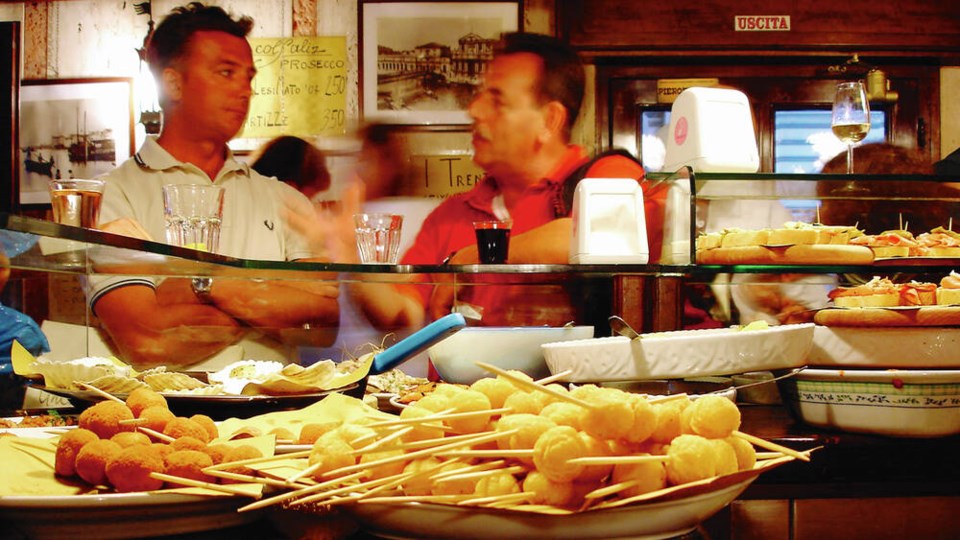While locals celebrate their cuisine in every country, Italians are perhaps the most exuberant about their food culture. Here’s an example of how going for a simple walk with a friend from Venice can become a lesson in expert eating.
At sunset I meet my Venetian hotelier friend, Piero, and we head for his friend’s restaurant. “Such a long line just to enter St. Mark’s Basilica today,” I tell him, “Even the back alleys were clogged with people. It’s a zoo.”
Piero leans toward me. “Yes! Zoo, zoo, zoo! Is a problem. In Venice the people come every day like a wave. There is no high season, no low season. Every morning we are invaded. But at six o’clock, the tourists go away.”
As if in command of the city, Piero waves a hand across the empty market square, grandly saying, “And now Venice lives. Really, Venice is a fine place in the night. Sleep in Venice and you see the quiet Venice. When you see a menu turistico, go away. When you see old men speaking Italian in a restaurant, this is a good place. I take you now to Bepi’s.”
Greeting old friends as we walk, Piero explains how in Venice, if you open a restaurant you must decide if you want to attract tourists or Venetians. “To make a tourist restaurant is no problem,” he says. “You see the people only one time. Even talking to them is not necessary. One-time visitors, it means bad food.”
We arrive at Trattoria da Bepi and Piero kisses the cheeks of the waiter before he continues. “For me, a good restaurant is like home. Mama is cooking.”
Sitting down at an outdoor table, Piero points out Bepi. He stands as if carved into his cicchetti bar, surrounded by toothpick munchies on trays and well-fed neighbours. Cicchetti (pronounced chi-KET-tee) are the Venetian version of tapas—an array of finger foods and appetizers that combine to make a speedy, tasty meal, best washed down with little glasses of wine.
“We are maniacs about fish in the North Adriatic,” Piero says, before introducing me to Bepi’s son, Loris. “Loris is a nightmare in the fish market. He knows what is no good…what is OK…always finds the best. His mama is a Venetian mama, Delfina. I ask her to tell me how she cooks the fish. She puts her hand on her heart and says, ‘There is no recipe. It is from here.’ ”
Loris and Piero work up a dinner plan on a scratch pad as if putting together the guest list for a very special evening. They discuss each plate like it’s an old friend.
Soon plates start to arrive. Piero goes immediately for the polenta with cod saying, “In the south they call the people of Venice ‘polenta eaters.’”
Piero splashes a hunk of bread into the broth under a pile of empty mussel shells and says, “You can feel the sea here.”
The conversation stops as a girl in a short wispy skirt prances by on the arm of a local Romeo. Piero says, “Is incredeeble. Look at this one! This is Venice. I am sorry. I am Italian. I watch the girls.”
As another lovely Italian woman struts by, Piero observes, “Giorgione, he is a good artist—yes—but this…this is better. Oh, Dio. I have a beautiful girlfriend. She is a model. But I cannot be married. It is impossee—”
I interrupt Piero by pretending to notice a woman over his shoulder. He stops mid-sentence to see what distracts me. It’s nothing—but I make my point: The default switch in his mind is set on girl-watching.
Suddenly, it’s back to the fine dining. Loris brings a plate of six crawfish with tails peeled and ready to bite. As I peer skeptically at the strange-looking creatures, Piero says, “More aliens.”
As I pick one up and bite off the tail, I notice how cold and limp it feels. I ask, “Is this raw?”
“Yes…Italian sushi.”
A bit later, Loris returns. “Now we have the pasta with crab sauce.” He serves Piero and puts the big bowl in front of me.
“Ahhh,” Piero says, “For the peasant family, this was the biggest honour…to get the original bowl.”
The real treat for me is the luxury of being able to eat local with a local in a place like Venice.
— This article was adapted from Rick’s new book, For the Love of Europe.
Rick Steves () writes European guidebooks, hosts travel shows on public TV and radio, and organizes European tours. You can email Rick at [email protected] and follow his blog on Facebook.



